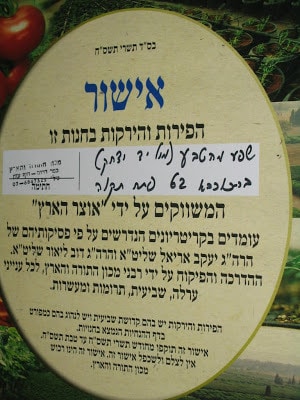This is one article in a seven-part series, recapping a shmita study group, sponsored by Hazon and Kevah. You can find other posts in the series on the shmita blog.
 Shmita (the sabbatical year), on the theoretical level, is a radical movement towards social equality, awareness of land ownership, understanding of good agricultural practices, and a major reconsideration of a monetary system.
Shmita (the sabbatical year), on the theoretical level, is a radical movement towards social equality, awareness of land ownership, understanding of good agricultural practices, and a major reconsideration of a monetary system.
Sounds like an interesting thought-experiment, right?
Well, Shmita is also a real-life system that is currently implemented in Israel, the only place where following the laws of Shmita are traditionally required. The various systems in place in Israel right now are quite complex. There are essentially four options to choose from when a farmer is deciding in what capacity he will follow the laws of Shmita:
- Continue life as normal
- Use the rabbinical tool of Heter Mechira
- Use the rabbinical tool of Otzar Beit Din
- Import food from outside of Biblical Israel
For someone just trying to buy food, this could get quite confusing. Do I follow the laws of Shmita? Do I trust the Heter Mechira certification? Should I just be extremely safe and buy only imported food (despite the harm to the Israeli economy). Why so many options? Why can’t we just follow Shmita the way the Torah explains it?
Well, for one, we need to eat during a Shmita year. Farmers need jobs. Agricultural land needs to be protected, not just open to the masses, as mentioned in the Torah. In modern Israel, there are geopolitical concerns related to shutting down the food industry every seven years. Shmita involves many complicated laws, including the sharing and burning of food waste, the use of some farming tools and not others. So there’s good reason to be using rabbinic workarounds, importing food, and taking the time to think about what form Shmita should realistically take.
As the next Shmita year is just around the corner (Rosh Hashanah 2014), it’s the perfect time to learn how Shmita affects the world in practical ways. For our friends and family in Israel, there will be another layer of deciding with food is kosher or not. Israeli farmers must choose how their food will be represented in Israel- will they cater to the religious or simply continue their practices? And most relevant to me and you, how will Shmita affect the American Jewish community? Some kosher certifications will only certify companies that follow specific Shmita regulations. Food we buy on a regular basis is being checked for compliance with Shmita laws.
It’s easy to get bogged down in the technicalities of the laws and which farmer or food company follows Otzar Beit Din versus Heter Mechira. Rather, we can glean something important from the convoluted way people follow the laws of Shmita. Jews think Shmita is worth keeping around. Whether it leads to the idealistic society that the Torah illustrates depends on how we incorporate these discussions into our lives. As more people learn about the next Shmita cycle, we hope they will be inspired to re-imagine and reapply Shmita to their lives- regardless of whether they choose Heter Mechira or Otzar Beit Din.
